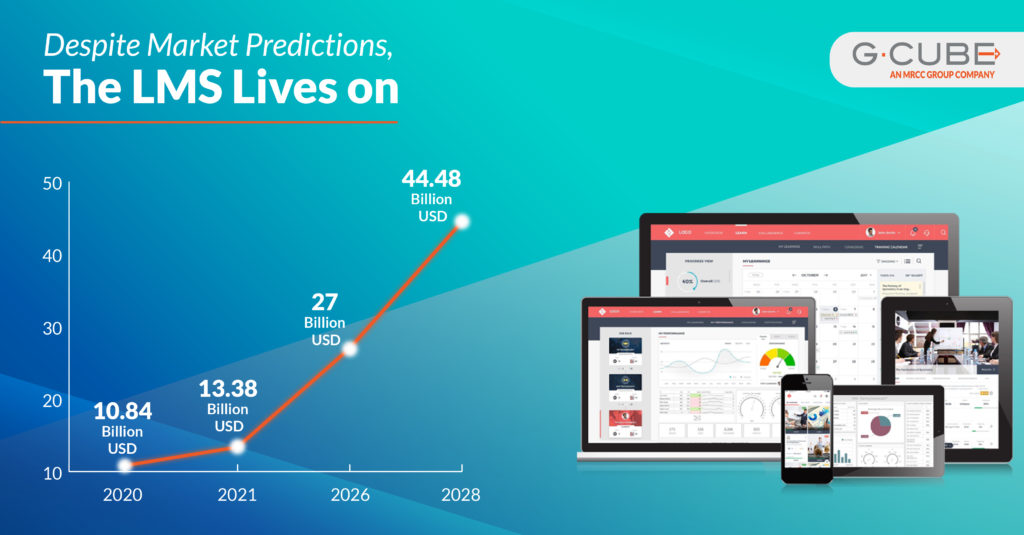“LMS is dead”—this statement came out more than a decade ago, in 2009–10. However, not only did the LMS survive; it also thrived by leaps and bounds. In 2017, Josh Bersin had written an article for Forbes stating: “Companies are starting to move away from their Learning Management Systems (LMS), buy all sorts of new tools for digital learning, and rebuild a whole new infrastructure to help employees learn.”
Four years after this prediction, FortuneBusinessInsight.com reported:
The Global Learning Management System market size was USD 10.84 billion in 2020. The global impact of Covid-19 has been unprecedented and staggering, with LMS witnessing a positive demand shock across all regions amid the pandemic. Based on our analysis the global market exhibited a significant growth of 23.8% in 2020 as compared to the year-on-year growth during 2017–2019. The market is projected to grow from 13.38 billion USD to 44.48 billion USD in 2028 at a CAGR of 18.7% in the 2021–28 period. The change in CAGR is attributable to this market’s demand & growth, returning to pre-pandemic levels once the pandemic is over.
The statistics confirm that even after the death verdict, the LMS demonstrated resilience against the market opinion and transformed itself in terms of features, functionalities, and technologies. Rapidly, it developed and embraced new technologies like artificial intelligence, big data, and consumer-level user-friendliness to maintain its supremacy. The modern LMS has adapted itself to create personalized learning paths for employees, AI-based suggestions to increase learning uptake, and most importantly, it created a collaborative environment for learning, even in a virtual space.
With the growing technology, management processes, and performance expectations, the need for new knowledge, skills, and even human behavior has evolved. Organizations cannot compete in this business by using old styles of work; it dawned this realization upon not only large corporations but also medium and small-sized companies. Most organizations have a growing need to empower their employees, customers, partners, and freelancers with knowledge, and in this age of information boom, they need a better system every second year to keep up.
In an article that came out in 2011, Ellen Behrens predicted that instead of the LMS dying out, it will significantly change in the years to come—most likely to continue including successful ways of providing access to learning across the world, smart ways to measure it, and last, implementations of social features that allow both association members and non-members (learners) to interact and connect.
There was a time when L&D specialists, analysts, and learners complained about the LMS gradually turning into a tedious and irrelevant application. However, the LMS providers did not fail to take notice of these complaints. According to Mr. Ankush Jagga, Business Head of Products & Growth at G-Cube: “We have served millions of learners in last 20 years and we have been constantly conducting surveys among the learners and the training providers to figure out what is needed and what needs to be eliminated from the LMS. So, at the end of the day, learners get a fantastic experience. Every quarter, we release new version of our LMS on the basis of the surveys and the opinion leader’s thought.”
Ten years down the line, Ellen Behrens’ prediction has come true. With digitization, jobs are changing rapidly, and skills required to adapt to this change are less mechanical and more human. Corporate training has thus become less about sporadic skill development or compliance training. The modern organization demands a culture of continuous learning and upskilling for the employees. To address this need, the 21st Century LMS has thus not become a manager for training and content but, rather, a coach to motivate the learners.
Just like humankind, software and applications also evolves. They take new shapes to adapt to the environment. Darwin’s theory of the “Survival of the Fittest” applies not only to humans but also to technology. So, the LMS, just like other software—CRM, ERP, HRMS, etc., have actively listened, made changes, and remained relevant and meaningful to the organizations.








